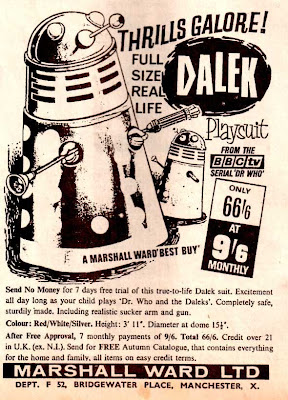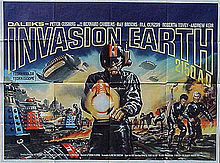"The Edge of Destruction" Originally Transmitted February 8-15, 1964
Episode 1: The Edge of Destruction
Episode 2: The Brink of Disaster
Written by David Whitaker
Directed by Richard Martin (Episode 1) and Frank Cox (Episode 2)
Producer: Verity Lambert
An explosion within the TARDIS renders the travellers unconscious. When they regain consciousness, strange happenings begin to occur. The TARDIS doors begin erratically opening and then closing whenever Ian moves near them. Parts of the TARDIS console dish out electric shocks. The scanner shows pictures of previous journeys. The faces of all the clocks in the ship start to melt away. Susan seems to become almost possessed (her demeanour changes significantly to much darker and threatening) and threatens Ian and Barbara with a pair of scissors. Unable to locate any problem with the TARDIS, the Doctor openly accuses Ian and Barbara of being responsible.
 |
| Paranoia and mistrust is rife amongst a TARDIS crew on The Edge of Destruction. Source of Image: http://tardis.wikia.com/wiki/The_Edge_of_Destruction_%28TV_story%29 |
In Over the Edge, a documentary included as part of the DVD release, Richard Martin (the director of part 1) reveals that the two-part serial was a "budget saver" and a "time-maker". There was a delay in the script and costume departments for Marco Polo, a seven part serial originally scheduled to follow The Daleks, but production of the series had to keep moving. In addition, The Daleks had gone over budget, meaning there was no money available for any new sets to be built or to hire any additional actors for The Edge of Destruction. The script was written at the last minute by series script editor David Whitaker, and was set entirely aboard the TARDIS (meaning no new sets were required to be built) and featured only the four regular characters - the Doctor, Ian, Barbara and Susan. The fact that the script was a last-minute filler may go some way to explaining some shortcomings in the plot of this serial which leaves loose ends unaccounted for. For example, Susan's strange and sudden changes in behaviour (described above) are never explained satisfactorily.
As noted by Verity Lambert (producer) in Over the Edge, The Edge of Destruction provided an ideal opportunity to focus on the main characters and to develop their relationships without any distractions from extraneous characters. In this regard, The Edge of Destruction is significant because it is a turning point. Prior to this point, the travellers are a disparate group. We see this overtly in The Daleks - when the Thals and the TARDIS crew split into two groups for an attack on the Dalek city, Ian and Barbara are in one group and the Doctor and Susan are with the other group. The friction between the Doctor and his human companions boils over in this two part serial, as the Doctor openly accuses them of being behind the strange goings on and threatens to put them off the ship. Barbara angrily refutes the Doctor's suspicions by reminding the Doctor that she and Ian risked their lives on Skaro to save the Doctor and Susan from the Daleks. She also cites Ian's bravery in the Cave of Skulls. It becomes apparent to the Doctor that Ian and Barbara are not to blame when the TARDIS's fault locator lights up, showing faults in every system. Another explosion rocks the ship. The Doctor realises the TARDIS's power source, located beneath the console, is trying to force its way out and they are only minutes from destruction (The Doctor declares "it would take the force of a total solar system to attract the power away from the TARDIS"). The four must then put their differences aside and work together. Once the problem with the fast return switch is discovered, thanks in a large part to some deductions by Barbara, the Doctor realises he has misjudged the pair and attempts to make amends. He apologises to Ian, who accepts straight away. Barbara needs more convincing but she is eventually won around. From this point on in the series we see a much closer knit TARDIS crew.
Other points of interest:
For the first time in the series we get hints that the TARDIS is something more than simply a machine.
At one point in episode one, Ian checks the Doctor's heart-rate and breathing and describes them as "normal". The idea that the Doctor's race, the Time Lords, have two hearts is a later development. In fact, at this point we haven't even heard the name Time Lord.
The Doctor never uses the fast-return switch again in the TV series (classic or revived). It has been used again in books and audio adventures.
In The Edge of Destruction, the fast-return switch is identified by the words "FAST RETURN" written above it in black felt on the TARDIS console:
 |
| The fast-return switch. Source of Image: http://tardis.wikia.com/wiki/Fast_Return_Switch |
The Edge of Destruction is available on DVD as part of a box set, The Beginning, that also includes the previous two serials, An Unearthly Child and The Daleks. The set also includes a 30 minute condensed version of the lost serial Marco Polo that follows The Edge of Destruction, that uses bits of the surviving soundtrack and photo stills.
Thanks for reading,
Nick.

























